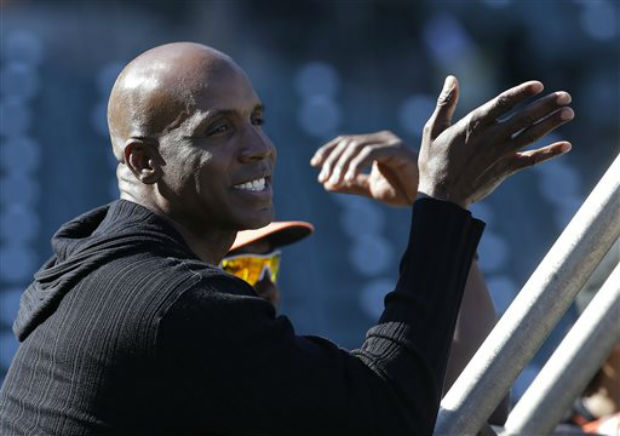US ends prosecution of Barry Bonds without conviction

In this Friday, July 10, 2015, file photo, former baseball player Barry Bonds watches batting practice before a baseball game between the San Francisco Giants and the Philadelphia Phillies in San Francisco. AP
SAN FRANCISCO—The U.S. Department of Justice on Tuesday formally dropped what was left of its criminal case against Major League Baseball career home run leader Barry Bonds over allegations he received performance-enhancing drugs, ending a nearly decade-long prosecution of one of the most famous American athletes.
The prosecution of Bonds for obstruction of justice ended quietly with the Justice Department’s one-paragraph court filing announcing that its solicitor general would not ask the U.S. Supreme Court to consider a lower court’s reversal of Bonds’ felony conviction.
Article continues after this advertisementA jury convicted the former San Francisco Giants star in 2011 of obstruction of justice for giving a meandering answer to a federal grand jury when asked about steroids injections. An 11-judge panel of the 9th U.S. Circuit Court of Appeals overturned that conviction in April.
The DOJ had to ask the solicitor general’s office for permission to appeal the ruling, said Rory Little, a former federal prosecutor who now teaches at the University of California, Hastings College of the Law in San Francisco. The DOJ said in its court filing that the solicitor general would not appeal the case, meaning the reversal of Bonds’ conviction would stand.
Little said the decision was not a surprise. Though the 9th Circuit’s ruling exposed confusion over the federal obstruction of justice law, it was not a good candidate for review by the U.S. Supreme Court because it generated four different opinions.
Article continues after this advertisement“The finality of today’s decision gives me great peace,” Bonds, who turns 51 on Friday, said in a statement. “As I have said before, this outcome is something I have long wished for. I am relieved, humbled and thankful for what this means for me and my family moving forward.”
Major League Baseball had no immediate comment on the Justice Department decision.
The U.S. Attorney’s office in San Francisco didn’t respond immediately to a phone call seeking comment.
The decision brings an end to the case against Bonds, which stemmed from an investigation of the Bay Area Laboratory Co-Operative that began in 2002 and saw the convictions of Olympic track gold medalist Marion Jones, elite sprint cyclist Tammy Thomas and former NFL defensive lineman Dana Stubblefield along with coaches, distributors, a trainer, a chemist and a lawyer.
“It seems that the government has finally come to their senses,” BALCO founder Victor Conte, who was sentenced to four months in prison and four months of home confinement, said in a statement. “In my opinion they should have never brought charges against Barry Bonds and wasted tens of millions of taxpayer dollars. … The Bonds case was simply a trophy-hunting expedition by these federal agents and prosecutors and I believe they need to be held accountable for this waste of federal funds.”
William Portanova, a former federal prosecutor now in private practice, disagreed, saying the prosecution acted as a deterrent despite the lack of a conviction. “There’s no question that the world paid attention to this case, so win, lose or draw, any potential steroid abusers saw that there’s a chance of getting tangled in the court system,” he said.
The BALCO investigation also helped lead to the drafting of the Mitchell Report, which called out many of baseball’s best players, including Roger Clemens, for alleged steroid use. Clemens was acquitted in 2012 on all charges that he obstructed and lied to Congress in denying he used performance-enhancing drugs.
Bonds was called before a grand jury investigating BALCO in 2003. He was charged four years later with lying to the grand jury about receiving performance-enhancing drugs and went on trial in 2011.
A jury convicted him of obstructing justice because of the answer he gave the grand jury when he was asked if his personal trainer Greg Anderson ever injected him with steroids.
“That’s what keeps our friendship,” Bonds replied. “I was a celebrity child, not just in baseball by my own instincts. I became a celebrity child with a famous father. I just don’t get into other people’s business because of my father’s situation, you see.”
Anderson refused to testify at trial and was imprisoned on contempt of court citations. The jury failed to reach verdicts on three counts charging Bonds with making false statements, and the government later dismissed those charges.
The 9th U.S. Circuit Court of Appeals in April said Bond’s answer when asked whether Anderson ever injected him with steroids didn’t amount to obstruction. The court said the answer wasn’t “material” to the sprawling federal investigation into sports doping.
After the 2011 trial and conviction, a federal judge sentenced Bonds to 30 days of home confinement, two years of probation, 250 hours of community service in youth-related activities and a $4,000 fine. Bonds served the home confinement before his conviction was overturned.
Bonds ended his career after the 2007 season with 762 career home runs, surpassing Hank Aaron’s long-standing record of 755.
Though Bonds is no longer a felon, many fans—and even some baseball peers—have concluded that he cheated by using performance-enhancing drugs. Tuesday’s decision to drop the case against him is not likely to help him with Hall of Fame voters.
In his third year on the Hall of Fame ballot this year, Bonds received 202 votes for 36.8 percent from the Baseball Writers’ Association of America. A player must garner at least 75 percent of the vote to be elected.